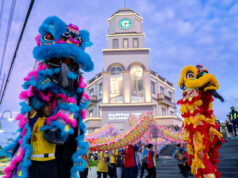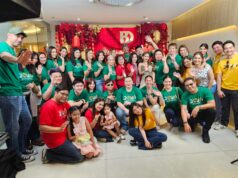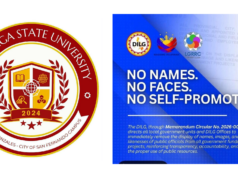“WE TOOK over a moribund airport. It was dormant for more than a decade, from 1990 (sic) since the Mount Pinatubo eruption until late 2001. Pero sayang, infrastructure was already there. We’ve learned there were potential investors but all of them didn’t continue. Puro maiden flights.”
On a factual error – Mount Pinatubo erupted in 1991 – began the abridged testimony of Victor Jose “Chichos” Luciano, president-CEO of the Clark International Airport Corp., on the coming of age of the Diosdado Macapagal International Airport. At least from a recent published news story.
Sayang, indeed, was the Clark Airport in-dormancy, what with its parallel runways, one of which was specifically designed by the former American occupants as alternative landing site for the space shuttle.
True, indeed, was Luciano’s claim of “Puro maiden flights” at the airport – prior to his coming – the first and last of Grandair being the Clark-Hongkong-Clark flight of June 1996. Of which we were one of the passengers. That which earned a bronze plaque displayed for a long time by the entrance of the airport terminal building carrying the names of all the maiden flight passengers. Which has since been taken down to parts unknown – perhaps to delete from collective memory that airline’s ignominy.
So it was Luciano as “CIAC head, who has been responsible for converting the military airport into a hub of budget airlines” with his marketing savvy, and thus “effectively lured several airlines into making DMIA their regular destination in the Philippines.” So the news story went.
So Luciano it was, that effected the coming of giant United Parcel Service to Clark in 2002 and has since made Clark as its inter-Asia hub, meaning packages from Europe and the US are being sorted out in Clark for distribution in nearby Asian countries.
So Luciano it was too that was instrumental in “luring in (sic) his former employer (Asiana Airlines) to make DMIA their base in the country.” Luciano’s pre-Clark persona was Asiana Airlines manager. So you thought it was a breeze for the man to get his former employer’s assent to base in Clark?
“Even though I came from them, it wasn’t that easy. Korean-based (sic) Asiana Airlines already had flights in NAIA (Ninoy Aquino International Airport). I travelled back and forth to Seoul and personally talked with the top executive. I brought them here and showed them our tourism potential. I let them play golf in Clark and even in Hacienda Luisita. They were thrilled.” So recounted Luciano of his charm offensive to get Asiana.
So thrilled, indeed, were the airline’s executives that from twice weekly chartered flights, Asiana’s Clark run was made daily, and now 11 times weekly, directly corresponding to the dramatic increase in the number of Korean arrivals.
“They were initially avid golfers who eventually brought in their family for long vacations, especially during winter. Soon, bigger planes were needed. Koreans came in not only as tourists but as investors, students and many as permanent residents,” proclaimed Luciano. “The revenue of Angeles City also doubled.”
So the City of Friendship had much to thank Luciano for, owing to him its Korean-kicked economic vibrancy.
All that and then some more.
“More than that, Asiana Airlines’ business grew because of the Philippine market. When I was with them, it was a raising (sic) airline. Now it’s the second flag carrier in Korea. Here in the Philippines, after 16 years of operation, in terms of international volume, it’s probably the second (sic) to Cathay Pacific. Ang laki rin ng transformation niya.”
So Luciano averred. So Asiana too owed Luciano a lot in its thriving operations in the country.
With the low-cost carriers – Air Asia and Tiger Airways notably – coming to Clark, and local carrier Cebu Pacific making the DMIA its third hub, again under Luciano’s inspired leadership at the CIAC, it could not in any way not only for the airport but for the whole of the Clark Freeport but to soar.
“Now, there are more than 300 companies/locators based inside the Clark Freeport zone, many from business processing and outsourcing (BPOs) firms to tourism and aviation.” So declared the news story, Luciano’s hand in the achievement implied all too subtly.
“Luciano has more plans for CIAC. One, he hopes that more airline companies, the flag carries, will make DMIA their base in Asia.”
So concluded the news story. Its end revealed there not too subtly: The imperative of retaining Luciano at CIAC as president-CEO.
With such magnificent achievement, Luciano has proven that CIAC is too small for him to rule, er, manage: nothing short of the whole Clark Freeport is commensurate to his talents.
Yeah, truly, modesty is the first casualty in the fight for survival.
On a factual error – Mount Pinatubo erupted in 1991 – began the abridged testimony of Victor Jose “Chichos” Luciano, president-CEO of the Clark International Airport Corp., on the coming of age of the Diosdado Macapagal International Airport. At least from a recent published news story.
Sayang, indeed, was the Clark Airport in-dormancy, what with its parallel runways, one of which was specifically designed by the former American occupants as alternative landing site for the space shuttle.
True, indeed, was Luciano’s claim of “Puro maiden flights” at the airport – prior to his coming – the first and last of Grandair being the Clark-Hongkong-Clark flight of June 1996. Of which we were one of the passengers. That which earned a bronze plaque displayed for a long time by the entrance of the airport terminal building carrying the names of all the maiden flight passengers. Which has since been taken down to parts unknown – perhaps to delete from collective memory that airline’s ignominy.
So it was Luciano as “CIAC head, who has been responsible for converting the military airport into a hub of budget airlines” with his marketing savvy, and thus “effectively lured several airlines into making DMIA their regular destination in the Philippines.” So the news story went.
So Luciano it was, that effected the coming of giant United Parcel Service to Clark in 2002 and has since made Clark as its inter-Asia hub, meaning packages from Europe and the US are being sorted out in Clark for distribution in nearby Asian countries.
So Luciano it was too that was instrumental in “luring in (sic) his former employer (Asiana Airlines) to make DMIA their base in the country.” Luciano’s pre-Clark persona was Asiana Airlines manager. So you thought it was a breeze for the man to get his former employer’s assent to base in Clark?
“Even though I came from them, it wasn’t that easy. Korean-based (sic) Asiana Airlines already had flights in NAIA (Ninoy Aquino International Airport). I travelled back and forth to Seoul and personally talked with the top executive. I brought them here and showed them our tourism potential. I let them play golf in Clark and even in Hacienda Luisita. They were thrilled.” So recounted Luciano of his charm offensive to get Asiana.
So thrilled, indeed, were the airline’s executives that from twice weekly chartered flights, Asiana’s Clark run was made daily, and now 11 times weekly, directly corresponding to the dramatic increase in the number of Korean arrivals.
“They were initially avid golfers who eventually brought in their family for long vacations, especially during winter. Soon, bigger planes were needed. Koreans came in not only as tourists but as investors, students and many as permanent residents,” proclaimed Luciano. “The revenue of Angeles City also doubled.”
So the City of Friendship had much to thank Luciano for, owing to him its Korean-kicked economic vibrancy.
All that and then some more.
“More than that, Asiana Airlines’ business grew because of the Philippine market. When I was with them, it was a raising (sic) airline. Now it’s the second flag carrier in Korea. Here in the Philippines, after 16 years of operation, in terms of international volume, it’s probably the second (sic) to Cathay Pacific. Ang laki rin ng transformation niya.”
So Luciano averred. So Asiana too owed Luciano a lot in its thriving operations in the country.
With the low-cost carriers – Air Asia and Tiger Airways notably – coming to Clark, and local carrier Cebu Pacific making the DMIA its third hub, again under Luciano’s inspired leadership at the CIAC, it could not in any way not only for the airport but for the whole of the Clark Freeport but to soar.
“Now, there are more than 300 companies/locators based inside the Clark Freeport zone, many from business processing and outsourcing (BPOs) firms to tourism and aviation.” So declared the news story, Luciano’s hand in the achievement implied all too subtly.
“Luciano has more plans for CIAC. One, he hopes that more airline companies, the flag carries, will make DMIA their base in Asia.”
So concluded the news story. Its end revealed there not too subtly: The imperative of retaining Luciano at CIAC as president-CEO.
With such magnificent achievement, Luciano has proven that CIAC is too small for him to rule, er, manage: nothing short of the whole Clark Freeport is commensurate to his talents.
Yeah, truly, modesty is the first casualty in the fight for survival.




